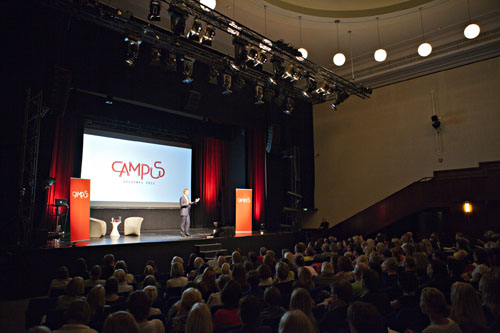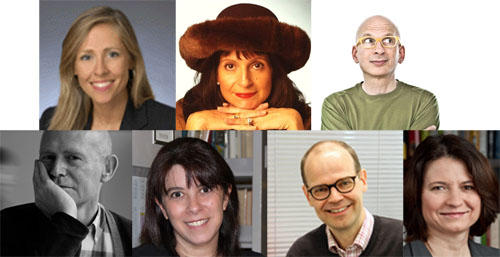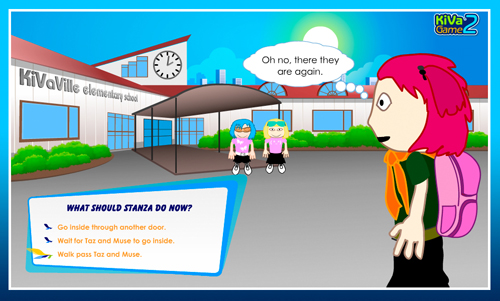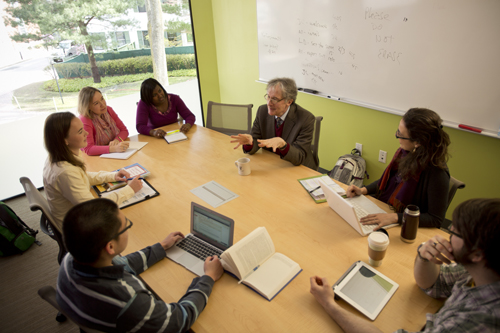
“کیمپس,” فن لینڈ میں پیدا ہونے والے ایک خیال (حالیہ بین الاقوامی موازنہ کے مطابق تعلیم میں سب سے اوپر کی درجہ بندی ملک), اس ہفتے کے روز منعقد کی جائے گی کہ تمام نیویارک شہر پبلک اسکول کے اساتذہ کے لئے ایک خصوصی پروفیشنل سیمینار ہے, May 4th at Sunshine Cinema in New York, in cooperation with the NYC Department of Education. The aim is to allow experts on a diverse range of topics, عصبی سائنس سے سائبر غنڈہ گردی کی خرابی کی شکایت کھانے, to share perspectives with educators on recent developments in those spheres.
“What is School For? The Power of the Heroic Teacher,” will be the keynote speech by blogger and best selling author Seth Godin. Other speakers include Gary Carter, ڈاکٹر. Eero Castren, ڈاکٹر. الزبتھ Englander, ڈاکٹر. Andrea Vazzana and Kathy Bostjancic. I was able to catch up with them to talk about some of the topics they will be addressing.
Seth, what makes a heroic teacher?
Seth: Heroism is about taking risks. Sometimes it’s the existential risk of running into a fire but more often than not it’s the vulnerability that comes from going off the beaten path, from standing up for what you believe in and, most of all, for caring more than you should.
الزبتھ, what makes cyber-bullying a major issue?
الزبتھ: Communicating through digital means represents a major change for the human race. Unlike the advent of some other technologies, cyberspace literally changes the way people perceive and understand each other. But because it is so new, these subtleties aren’t well understood, and thus the impact of social cruelty that occurs digitally is still an area of intensive study. بچوں, خاص طور پر, often don’t understand how severely their digital words and their sharing of images can affect their peers (اور دوسروں), and thus the social problems caused by cyber-communications are far too frequent and can be very severe. For all its advantages, cyber-communication can also lead to serious problems, including depression, پریشانی, problems with social skills, and difficulties in human relationships. Cyber-bullying is a major issue simply because it causes a great deal of grief and will not subside before it is better understood and before this knowledge is successfully transmitted to users.
گیری, do you believe our education system is doing enough for children with learning disabilities?
گیری: As I am neither an American, nor an educationalist, I am not qualified to comment on whether this education system does enough for children with learning disabilities. I am the parent of an adopted disabled child.
تاہم, I am convinced that mainstream society in the Western world undervalues the lived experience of people with all kinds of disabilities, physical and developmental/learning. We assume that the experience of individuals with disabilities is somehow less than ours, or lacking, and as a result we tend not to focus on understanding, participating in, or enriching their experience of the world. We tend instead to move from a position of pity, to discussing the impact of non-mainstream children on parents and other (mainstream) family members, again usually in a context of the difficulties families experience in managing, dealing with or living with disabled members. This has a number of dangerous implications: it tends to make the whole family ‘about’ the disabled member, at the expense of other members of it, and at the same time it does little to enrich the life experience of the disabled individual or the other family members.
There is surprisingly little focus by professionals on the direct relationship or interface between mainstream family members and disabled family members, in an emotional sense and experiential sense, and even less on ensuring that disabled family members have a rich emotional and conceptual experience of the world. It’s as if we cannot imagine that a world that is experienced fundamentally differently to ours can be valuable, rich and inspiring.
Eero, how significant an impact can the neuroscience of learning have on what and how students are taught?
Eero: Many forms of learning take best place during sensitive periods in childhood and juvenile life. We have recently learned a great deal of new things about how learning can be promoted in adults, when the sensitive periods are closed, and about the neurobiological basis of this enhanced learning. Experiments performed in rodents demonstrate that certain commonly used drugs, such as the antidepressant Prozac, can promote learning by activating in adult brain a state similar to that present during sensitive periods of learning in juveniles. Drug treatment needs to be combined with a training program for any beneficial effects to become apparent. A similar plastic state can be activated by purely environmental changes, such as an enriched environment. It is currently unclear how these treatments might influence children still within the sensitive periods of learning, but these findings underlie the importance of a stimulating and supportive environment for optimal learning.
اینڈریا, how big of an issue is body image for students in the classroom?
اینڈریا: Awareness of one’s appearance begins during the preschool years. افسوس کی بات ہے, negative body image begins soon thereafter and increases with age, peaking in adolescence. Among grade school kids, most girls and nearly half of boys report body dissatisfaction. It’s estimated that by adolescence, one-third of girls engage in unhealthy weight-control practices (یعنی, fasting, self-induced vomiting, diet pill/laxative use). Kids learn from parents, اساتذہ, peers and the media to value thinness (for girls) and muscularity (for boys). Deviations from the ideal can result in decreased self-worth, even among normal weight individuals. سکول, where the preponderance of peer interactions occurs, is a prime setting for appearance-related conversations and comparisons. The school’s physical environment, as well as faculty’s role-modeling and direct comments, sometimes provides further inculcation of idealized appearance standards. The past decade has seen the development of school-based interventions that realign body image with realistic standards and protect students from otherwise deleterious effects.
Kathy, what should we be teaching students about the interconnectedness of global economies?
Kathy: U.S. economy still remains the single largest in the world, and its influence remains great. تاہم, the winds of economic power are shifting from the advanced economies to the emerging economies. میں 2000, the advanced economies, امریکی سمیت, یورپ, and Japan, accounted for 60 percent of total world economic activity, while the emerging economies accounted for 40 فیصد. Just a decade later in 2010, the split between advanced and emerging economies shifted to 50 فیصد – 50 فیصد. میں 2020, the emerging economies are projected to outpace the advanced economies, with the split moving to 60 فیصد – 40 percent in favor of the emerging economies. And China is forecast to displace the U.S. as the largest economy. اس کے علاوہ, the global economies and financial markets are becoming more and more interconnected. Given these global realities, it is critical that U.S. students view the U.S. economy and their own future within a global context.
For more information and registration: HTTP://campusnyc.eventbrite.com


تعلیم کے لئے عالمی تلاش میں, سر مائیکل باربر سمیت میرے ساتھ اور عالمی سطح پر معروف فکری رہنماؤں (برطانیہ), ڈاکٹر. مائیکل بلاک (امریکہ), ڈاکٹر. لیون Botstein (امریکہ), پروفیسر مٹی Christensen کے (امریکہ), ڈاکٹر. لنڈا ڈارلنگ-ہیمنڈ (امریکہ), ڈاکٹر. مادھو چوہان (بھارت), پروفیسر مائیکل Fullan (کینیڈا), پروفیسر ہاورڈ گارڈنر (امریکہ), پروفیسر اینڈی Hargreaves نے (امریکہ), پروفیسر کریں Yvonne ہلمین (نیدرلینڈ), پروفیسر کرسٹن Helstad (ناروے), جین Hendrickson نے (امریکہ), پروفیسر گلاب Hipkins (نیوزی لینڈ), پروفیسر Cornelia Hoogland (کینیڈا), فاضل جیف جانسن (کینیڈا), مسز. چینٹل کوفمین (بیلجیم), ڈاکٹر. Eija Kauppinen (فن لینڈ), سٹیٹ سیکرٹری Tapio Kosunen (فن لینڈ), پروفیسر ڈومینک Lafontaine (بیلجیم), پروفیسر ہیو Lauder (برطانیہ), پروفیسر بین لیون (کینیڈا), رب کین میکڈونلڈ (برطانیہ), پروفیسر بیری McGaw (آسٹریلیا), شیو ندار (بھارت), پروفیسر R. نٹراجن (بھارت), ڈاکٹر. PAK NG (سنگاپور), ڈاکٹر. ڈینس پوپ (امریکہ), شریدر رازگوپالن (بھارت), ڈاکٹر. ڈیانے Ravitch (امریکہ), رچرڈ ولسن ریلی (امریکہ), سر کین رابنسن (برطانیہ), پروفیسر Pasi Sahlberg (فن لینڈ), Andreas کی Schleicher (پیسا, او ای سی ڈی), ڈاکٹر. انتھونی Seldon نے (برطانیہ), ڈاکٹر. ڈیوڈ Shaffer کے (امریکہ), ڈاکٹر. کرسٹن عمیق کر رہے ہیں (ناروے), چانسلر اسٹیفن Spahn (امریکہ), ایوز Theze (اسکول Français کی امریکہ), پروفیسر چارلس Ungerleider (کینیڈا), پروفیسر ٹونی ویگنر (امریکہ), سر ڈیوڈ واٹسن (برطانیہ), پروفیسر Dylan کے Wiliam (برطانیہ), ڈاکٹر. مارک Wormald (برطانیہ), پروفیسر تیو Wubbels (نیدرلینڈ), پروفیسر مائیکل نوجوان (برطانیہ), اور پروفیسر Minxuan جانگ (چین) وہ تمام اقوام کو آج سامنا ہے کہ بڑی تصویر تعلیم سوالات دریافت کے طور پر. تعلیم کمیونٹی پیج کے لئے گلوبل تلاش
C. M. روبن وہ ایک موصول ہوئی ہے جس کے لئے دو بڑے پیمانے پر پڑھا سیریز کے مصنف ہے 2011 میں Upton سنکلیئر ایوارڈ, “تعلیم کے لئے گلوبل تلاش” اور “کس طرح پڑھیں گے?” انہوں نے تین bestselling کتابوں کے مصنف ہیں, سمیت Wonderland میں یلس اصلی.





حالیہ تبصرے